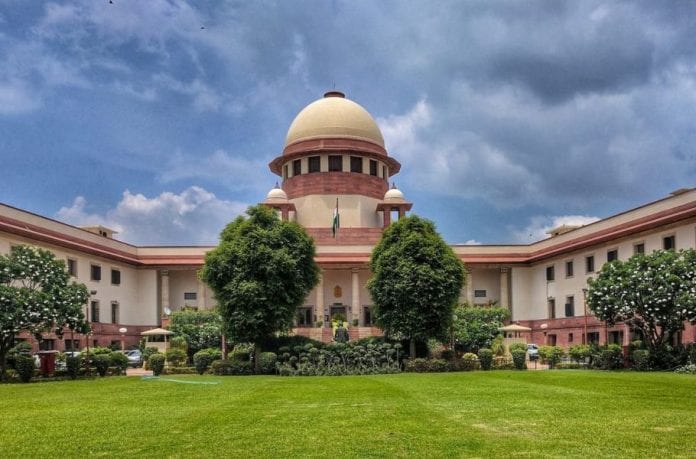
In a huge relief to non-government organisations working in the field of human rights and social welfare, the Supreme Court has ruled that as long as they are not affiliated to any political party, these organisations are not barred from seeking funding from international sources in terms of the Foreign Contribution (Regulation) Act (FCRA) 2010 and Rules made thereunder.
According to section 3 (1) (f) of the FCRA 2010, “No foreign contribution shall be accepted by any organisation of a political nature.” Rule 3 of FCRA Rules 2011 laid down norms for declaring an organization. Their validity was challenged by the petitioner Indian Social Action Forum (INSAF) in the SC. Rules (v) and (vi) were found to be particularly problematic by NGOs as they state that: “The Central Government may specify any organisation as organisation of political nature on one or more of the following grounds:-
(v) organisation of farmers, workers, students, youth based on caste, community, religion, language or otherwise, which is not directly aligned to any political party, but whose objectives, as stated in the Memorandum of Association, or activities gathered through other material evidence, include steps towards advancement of political interests of such groups;
(vi) any organisation, by whatever name called, which habitually engages itself in or employs common methods of political action like ‘bandh’ or ‘hartal’, ‘rasta roko’, ‘rail roko’ or ‘jail bharo’ in support of public causes.”
This was hugely problematic as NGOs often express dissent by organizing public gatherings and peaceful protests. Moreover, it gave the central government a wide range of ambiguous rights. In fact, many NGOs have alleged harassment at the hands of the government. Vindictive regimes are known to have withdrawn FCRA licenses of organisations that they perceive as a threat to their agenda.
Now, a division bench comprising Justices L Nageshwar Rao and Deepak Gupta, has read down rule 3 (v) and 3 (vi). The SC said in its judgment, “A balance has to be drawn between the object that is sought to be achieved by the legislation and the rights of the voluntary organisations to have access to foreign funds.” It added, “… those voluntary organisations which have absolutely no connection with either party politics or active politics cannot be denied access to foreign contributions.”
The judgment further said, “Support to public causes by resorting to legitimate means of dissent like bandh, hartal etc. cannot deprive an organisation of its legitimate right of receiving foreign contribution. It is clear from the provision itself that bandh, hartal, rasta roko etc., are treated as common methods of political action. Any organisation which supports the cause of a group of citizens agitating for their rights without a political goal or objective cannot be penalized by being declared as an organisation of a political nature.”
The entire judgment may be read here:
Sabrang FCRA case
As mentioned earlier, vindictive regimes are known to have penalised organisations that threaten their agenda. Sabrang Trust has been in the eye of the storm in a similar case. Co-founded by journalists and activists Teesta Setalvad and Javed Anand, Sabrang has been at the forefront of exposing divisive politics and communal agenda of the right-wing supremacist organisations as well as their members and sympathisers in the ruling regime.
While Sabrang’s previous publication Communalism Combat exposed the ugly truth behind communal riots in Mumbai, and bomb blasts in Malegaon among other instances of targeted violence, Setalvad and Anand’s work has not been limited to just the printed word.
Forged in the fires that ravaged Gujarat in the aftermath of the Godhra train burning incident in February 2002, Citizens for Justice and Peace, a humanitarian organisation, spearheaded the quest for justice for riot affected people by holding the top brass of the Gujarat state government, administration and police accountable. Teesta Setalvad is the secretary of CJP and has spent years helping survivors of the violence get justice in the courts and beyond.
A vindictive regime started hounding Setalvad and Anand, and when they failed to arrest the duo on trumped up charges, they launched a witch hunt using provisions of the FCRA 2010. In 2015, writing to the MHA, now under the same political dispensation that was in power in Gujarat during the genocidal carnage of 2002, the Gujarat Police goaded them into an investigation under the Foreign Contribution Regulation Act (FCRA) against all three organisations run by the couple, viz. Sabrang Trust, Citizens for Justice and Peace (CJP) and Sabrang Communications.
For one whole week in June 2015, all the aforementioned organisations cooperated fully with the MHA, answered all queries and submitted all documents for scrutiny. The organisations also pointed out the malicious nature of the various cases foisted upon them. They also pointed out linkages between the powerful perpetrators of the riots and the chief complainant in each case, a disgruntled former employee.
Within weeks of this MHA visit, there were rumours in the media, that despite satisfying all requirements of investigation agencies, another case could be initiated by the CBI against one of the organisations. Setalvad and Anand wrote to the CBI offering full cooperation. Despite this the CBI conducted raids on the properties of the organisations.
Both, Setalvad and Anand have been forced to run from pillar to post to seek anticipatory bail multiple times, despite fully cooperating with police investigations and making all documents available for scrutiny on each occasion.
On the subject of the landmark judgment, CJP secretary Teesta Setalvad said,
“The judgement of the Supreme Court is a welcome interpretation of a grossly misused law. Today, political parties have given themselves complete impunity from financial scrutiny and media stooges vilify both rights groups and people’s movements.”
Related: